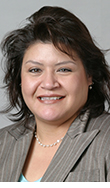Colonias program promotoras help Socorro flooding victims

Pema Garcia
See El Paso Times' [photos] (http://photos.elpasotimes.com/2013/09/19/photos-socorro-area-residents-clean-up-after-flood/#1) of the Socorro flood.
The Texas A&M Colonias Program came to the aid of [flood-stricken] (http://photos.elpasotimes.com/2013/09/12/photos-flooding-in-el-paso-county-juarez/#1www.franceswhitehead.com) West Texans last September when heavy rain and rising water drove many colonia residents in Socorro, a suburb of El Paso, from their homes.
The local community center, operated by the Colonias Program and the city of Socorro, was transformed into an emergency operations center, and the program’s community workers, known as promotoras , were dispersed around the community to check on residents threatened by the floodwaters.
The program responds to flooding and other weather-related hazards as part of a local emergency weather task force, said Pema Garcia, who directs the Colonias Program’s Western Rio Grande region.
Approximately 25 colonias families were aided after the flooding by promotoras Cecy Ordoñez and Lety Pasillas.
They checked on elderly colonias residents who might have had trouble evacuating during the flooding, said Garcia, and they are helping an elderly couple, whose house was destroyed by the flood, find a new home.
During the flood, workers at the community center directed flood victims to a temporary shelter operated by the Socorro Independent School District and afterward provided referrals to aid organizations offering flood relief services.
The Colonias Program, on behalf of the state of Texas, works to improve the quality of life for residents of colonias — impoverished, relatively undeveloped villages near population centers on the U.S. side of the Texas-Mexico border that generally lack one or more of the physical infrastructure amenities most people take for granted, such as running water, sewer systems, paved roads and storm drainage.
That role is expanded to offer emergency services when disaster strikes or when the weather turns dangerous.
“In the winter, along with our task force partners, promotoras distribute blankets and space heaters to households with the elderly or young children, and we distribute fans in the summer,” Garcia said.
Promotoras are trained social service workers who link colonias residents to the myriad services offered by public and private social service organizations.
To become promotoras , individuals, most of whom are colonias residents, complete a six-month course of training that sharpens their interpersonal and organizational skills while familiarizing them with public and private social service organizations.
Once trained, promotoras canvass colonias to determine residents’ needs and connect them to these organizations. “They keep information flowing both ways between the colonias and social service organizations,” said Garcia.
Promotoras and other program staffers work closely with colonia residents to carry out a wide range of programs such as providing [lunch] (http://one.arch.tamu.edu/news/2011/8/9/chud-texas-colonias/) for children in the summer, creating potable [water] (http://archcomm.arch.tamu.edu/archive/news/spring2009/stories/munoz_CHUD.html) , GED instruction, economic and community development assistance, and programs addressing literacy, job training, dropout prevention, job referral, health education and many more.
The Texas legislature established the Colonias Program in 1991 and asked Texas A&M’s College of Architecture to oversee it. Since then, the program, aimed at catalyzing community self-development, has grown to include a central office in San Antonio, three regional offices that serve colonias throughout the length of the Texas-Mexico border and 42 community resource centers.
Tags
Related Posts
Study to forecast behavior during hurricane threats

TTC helping small towns make plans

Nigerians receive LAND students’ plan for medical city

Students creating high-density plans for Texas A&M
Follow Us
Facebook Twitter Vimeo Youtube Flickr RSS
Recent Posts

Planning prof heads study of disaster housing aid

A message from the dean

Former student remembered as expert planner

Leading educator named new head of Architecture Dept.




_thumbnail_small.png)
